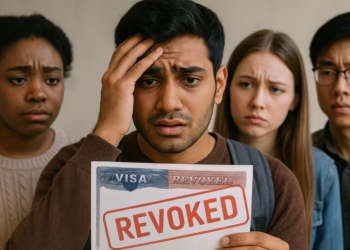According to data from the Department of Home Affairs, the aggregate Vocational Education and Training (VET) grant rate for overseas applications between August and December 2022 was 3.8% for Indian students, 16.8% for Nepal, and 23.4% for Pakistan.
Some members of The Professionals in International Education (PIE) News believed that the DHA “seems to be contemptuous of the international skills training sector,” according to Troy Williams, CEO of Independent Tertiary Education Council Australia (ITECA), as reported by The PIE news earlier this month.
Williams continued, “The student visa application rejection rate is more profound in the international skills training sector, with some members now questioning whether their institution will be viable over the medium term.”
The government is “sending mixed messages to the Indian student market,” according to ITECA, which said in a submission to the government’s migration system review that the country is “finalising a trade agreement with India while maintaining low visa grant rates to Indians.”
The high rejection rate “damages Australia’s reputation as a destination of choice for overseas students looking to gain valuable vocational skills and training and makes it difficult for Australian institutes to fill the courses,” said Dugald Murray, executive director of the Victorian TAFE Association.
According to VET expert Claire Field, Australia’s persistent visa backlog, which has plagued the country since its borders were reopened at the end of 2021, contributes to the high refusal rates for visas.
According to Field, “The government then recruited more visa processing officials to tackle the backlog, but it appears that many of the new staff do not have immigration or education sector expertise.”
Last year, Phil Honeywood, CEO of the International Education Association of Australia (IEAA), expressed worry about a shortage of skilled personnel at Australian embassies.
Australia has experienced a jump in demand at the same time. According to the DHA, applications for offshore student visas between July and October 2022 were 40% higher than for the same period in 2019.
Field states, “With VET course fees much lower than higher education fees and some VET providers further discounting to attract new students – these measures attracted some students looking to work full-time on a student visa.”
However, the DHA issued a warning in July of last year after discovering fake documents in student visa applications near the end of 2022. Additionally, media claims of the involvement of VET providers in sex trafficking later that year also surfaced.
According to anecdotal reports, it appears likely that some newly hired visa processing officers in the Department of Home Affairs then took a highly risk-averse attitude, which is why some students’ visas were frequently refused, according to Field.
On the other hand, it’s also apparent that some VET providers and education agencies have been utilising the advantage of limitless work rights to promote applications from bogus students.
The Victorian TAFE Association, which speaks for Victoria’s 12 TAFE institutions, submitted comments to a parliamentary enquiry urging the government to “prioritise and differentiate visa applications for international students who choose to study at TAFEs” rather than private registered training organisations. They also requested that TAFE visa data be separated from general VET data.
According to Murray, TAFEs are publicly owned, subject to strict local, state, and federal oversight, and provide the greatest quality, according to The PIE. “Differentiated visas for international students seeking to study at a TAFE institute would help to lift visa approval rates while maintaining quality and student outcomes,” the report states.
According to a representative, the DHA acknowledges the contributions foreign students contribute to Australia. It stated, “Visa application assessments are based on their individual merits and against the criteria prescribed in Australia’s migration legislation.”
“Decisions made to grant, or refuse a student visa application are balanced against the intent of the student visa program. That is to facilitate the entry of genuine students seeking to travel to Australia for the purpose of undertaking study,” it added.










